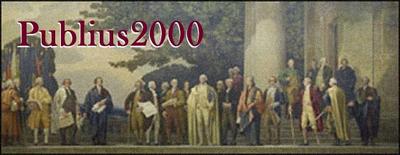I haven't as yet read the opinion and but I will as soon as possible. Regardless, I thought I would give some initial reactions to this case based upon the news reports that I have heard or read.
First, the reporting on this case and Supreme Court cases in general, reveal a complicity among the media in embracing the destructive view of the Supreme Court as policy maker.
Much of the reporting tends to portray the Supreme Court as the ultimate policy maker rather than mere interpreters of the Constitutional text. Accordingly, in discussions of the issue, media reports often focus merely on the policy merits of the issue at hand. They treat Supreme Court cases almost exactly as if they were pieces of legislation and the only considerations are the relative wisdom or justice of the issue and not the Constitutionality of the issue.
For example, one news report on the radio gave a quick summary of the decision and then gave a few brief public reactions from people on the street. The clips were basically people's opinion on the wisdom or morality of the issue and nothing regarding the Constitutionality of the issue.
The clips were similar to the following:
"Oh I agree with the Court, young people shouldn't be executed."
the next clip
"I think the decision is wrong, why shouldn't a 17 year old be held accountable like an 18 year old."
Then the report signs off, leaving the impression that the case has been adequately and fully covered, especially since they had sound bites from two citizens with differing opinions on the matter. There is no hint that perhaps the Court ruling had to do with the Courts interpretation of the text rather than their view of the policy.
Here is how the opening paragraph of an NPR online story read:
"The Supreme Court on Tuesday abolished the death penalty for convicted killers who committed their crimes before the age of 18. The court ruling, closely divided at 5-to-4, affects 72 people in 20 states. The practice will also be banned for any future crimes."
The Court abolished it?
or
Did the Constitutional text (democratically ratified by the people) compel the court to rule laws allowing the death penalty for minors unconstitutional?
The Court is not allowed to "abolish" they are only allowed to interpret. While they often don't restrain themselves to merely interpreting, such reporting merely serves to legitimate this disturbing practice in the mind of the public.
Whatever one's opinion of the issue, the policy merits of taking one position or the other should not be the question before the Court. The real question is whether or not this policy or law is "Constitutional" not whether or not it is "wise" "just" or in the "public interest."
The role of the Court is not to determine the merits of a given policy.
The role of the Court is to simply establish whether or not a given policy is Constitutional.
Granted the Court is not good at maintaining this distinction themselves, and they engage in policy making all the time, thus contributing greatly to this poor reporting. Ultimately, the reporting often falls right in line, pretending that it is perfectly fine for the the Court to tell the rest of us what is moral or just on a given policy issue rather than simply telling us whether or not this policy (irregardless of its wisdom) is indeed allowable under the Constitution.
The hard truth that many do not want to face, is that:
The Constitution allows for unjust policies to be enacted by the people.
The remedy for unjust policies is making the public case for justice to fellow citizen's, mobilizing like minded citizens, lobbying one's legislature, and electing representatives who agree with you. In short, in a democracy one must build a consensus amongst one's fellow citizens to get that unjust policy overturned, democratically.
The proper remedy is not to take a short cut by hiring lawyers skilled at convincing five elite citizens in positions of power to pronounce what is or is not moral for the rest of society. This does not lay our nation's core policies on a firm democratic foundation.
When government does enforce moral positions it is best done with the establishment of broad support in society and it should reflect a moral consensus among the nation's citizens. There is a big difference between the assertion of a national concensus and the actual existence of one. A true national consensus is best built and recorded through the workings of the democratic process, not from pronouncements on high.
In the end, news reports that fail to make this basic distintion between policy making and Constitutional interpretation by the Supreme Court are simply aiding and abetting the regrettable development in American Constitutoinal Jurisprudence, where the Court is widely seen as the arbiter of national morality.
-Publius2000

